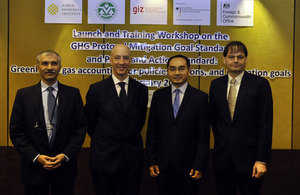UK funds a lunch and training workshop on GHG protocol standards
The UK Government's Foreign and Commonwealth Office funded a training workshop on "Greenhouse Gas Accounting for Policies, Actions, and Mitigation Goal" on February in Bangkok.

Workshop on GHG protocol standards
The workshop marked the launch in Asia of two Greenhouse Gas Protocol standards developed by the World Resources Institute:
- the Policy and Action Standard, an international standard for estimating the greenhouse gas effects of policies and actions, and
- the Mitigation Goal Standard, an international standard for accounting for national and subnational GHG reduction goals.
The standards are relevant to designing, assessing, and reporting on Intended Nationally Determined Contributions (INDCs), Nationally Appropriate Mitigation Actions (NAMA) and other domestic mitigation actions.
Both standards were published in November 2014 after a two year development process, which included 270 participants from 40 countries and pilot testing on 30 policies, actions, and goals in 27 countries.
Speaking at the launch and training workshop, British Ambassador to Thailand Mark Kent:
the workshop is a well timed addition to the Second Regional Technical Dialogue on INDCs for Asia Pacific and Eastern Europe which was so ably delivered by UNDP and other colleagues earlier this week.
We need to do two things. Firstly, we need to meet the shared climate change challenge that is required to keep future climate change within safe limits. This is the outcome that all UNFCCC parties have agreed to work for, and which I believe all countries represented here want to achieve.
Secondly, we need to ensure that we all have serious and credible national plans in place, not only to adapt to the climate change we cannot avoid, but to reduce our greenhouse gas emissions in line with our national capabilities to do so.
The one-day workshop attracted 110 people from government agencies, researchers, and academics across the Asia Pacific region. It has trained participants on how to use the standards and share experiences from pilot testers in the region who have applied the standards.
The workshop followed the “Regional Technical Dialogue on INDCs to the 2015 Agreement under the UNFCCC”.